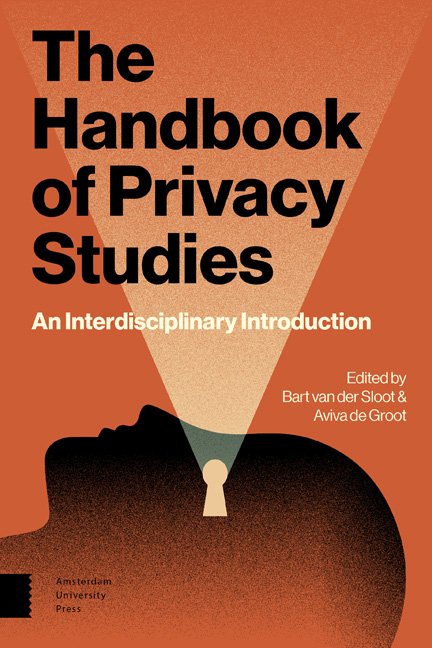Book contents
- Frontmatter
- Contents
- Introduction
- 1 Privacy from a Historical Perspective
- Legislating Privacy: Technology, Social Values, and Public Policy
- 2 Privacy from a Legal Perspective
- Three Dimensions of Privacy
- 3 Privacy from an Ethical Perspective
- Nudging: A Very Short Guide
- 4 Privacy from an Economic Perspective
- Security, Privacy, and the Internet of Things (IoT)
- 5 Privacy from an Informatics Perspective
- Political Science and Privacy
- 6 Privacy from an Intelligence Perspective
- A Privacy Doctrine for the Cyber Age
- 7 Privacy from an Archival Perspective
- Medical Privacy: Where Deontology and Consequentialism Meet
- 8 Privacy from a Medical Perspective
- Privacy Law – on the Books and on the Ground
- 9 Privacy from a Media Studies Perspective
- Diversity and Accountability in Data-Rich Markets
- 10 Privacy from a Communication Science Perspective
- Still Uneasy: a Life with Privacy
- 11 Privacy from an Anthropological Perspective
- About the Authors
1 - Privacy from a Historical Perspective
- Frontmatter
- Contents
- Introduction
- 1 Privacy from a Historical Perspective
- Legislating Privacy: Technology, Social Values, and Public Policy
- 2 Privacy from a Legal Perspective
- Three Dimensions of Privacy
- 3 Privacy from an Ethical Perspective
- Nudging: A Very Short Guide
- 4 Privacy from an Economic Perspective
- Security, Privacy, and the Internet of Things (IoT)
- 5 Privacy from an Informatics Perspective
- Political Science and Privacy
- 6 Privacy from an Intelligence Perspective
- A Privacy Doctrine for the Cyber Age
- 7 Privacy from an Archival Perspective
- Medical Privacy: Where Deontology and Consequentialism Meet
- 8 Privacy from a Medical Perspective
- Privacy Law – on the Books and on the Ground
- 9 Privacy from a Media Studies Perspective
- Diversity and Accountability in Data-Rich Markets
- 10 Privacy from a Communication Science Perspective
- Still Uneasy: a Life with Privacy
- 11 Privacy from an Anthropological Perspective
- About the Authors
Summary
Introduction
Privacy has never been a major topic for historians. After the first publication of a study on the concept of privacy in colonial history in 1972, it took another 44 years before David Vincent published the first monograph on the history of privacy. However, over the last twenty years privacy has received more attention of historians, especially in an attempt to historicize growing concerns about modern surveillance techniques. This has indeed provided new insights into contemporary challenges as well as the history of privacy, for example that privacy has had different meanings and as an ideal came into existence under specific historical circumstances. Moreover, over the last 30 years concerns of privacy and privacy regulations have influenced the profession of historians.
Here it is important to stress that historians have their own research methods. They focus on continuity and change over time and pay ample attention to the context in which certain ideas and practices have developed. The historical discipline's main concern is therefore to understand the past on its own terms. The methodology historians use assumes that the past can only be made accessible through source criticism, the interpretation of sources and literature, and the construction of a historical narrative. Historical narratives may change when new sources are discovered, old sources are restudied with the help of new (digital) methods or when a new generation of historians asks new questions about the past informed by contemporary challenges. This explains why historians make a distinction between the past as such and historical narratives about the past. The latter, the history of history writing, is called historiography. Studying the historiographical trends in general and the historiography of the topic under scrutiny more precisely, is essential for historians. It provides insight into how historians have dealt with the past, the methods they have used, and the different interpretations of the same past that can (co)exist and the debates this variety has caused among historians. Understanding and accepting these aspects is what might be called ‘historical awareness’, as the historiographer and methods historian John Tosh has stressed.
- Type
- Chapter
- Information
- The Handbook of Privacy StudiesAn Interdisciplinary Introduction, pp. 21 - 56Publisher: Amsterdam University PressPrint publication year: 2018
- 2
- Cited by



